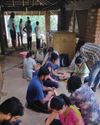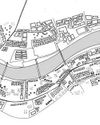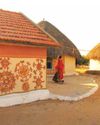
Architecture of greed
Architecture has become a capitalist. It prides itself on guzzling tremendous amounts of energy and resources to maintain new higher standards of comfort and luxury. In the present architectural scenario, one is veering towards the new age methods where humanistic considerations are no longer the primary logic for the evaluation of the design. This has led to a disconnect from tradition and given us an increasing number of impersonal, anonymous buildings. Unfamiliarity with this so-called ‘new age architecture’ adversely affects the psyche of the people inhabiting it. Our designs today are taking us further away from nature. They are also distancing us from each other by creating closed, controlled, invulnerable and non-interactive spaces. Thanks to easy access to information, we learn of developments across the globe instantaneously. There are too much data and knowledge, but very little wisdom to use it appropriately. Most modern, developed cities across the world look very similar, whether it is Singapore, shanghai, or New York. We can see Indian architecture heading in the same direction. Our urban areas are blindly following the western language of office-building – first creating a glass box, then closing it with curtains and blinds to avoid glare on monitors, then switching on the lights and pumping more energy for the so-called 5-star rated ACs to reduce heat gain through the glass. This is a criminal waste of resources.
Diese Geschichte stammt aus der IAB October 2019-Ausgabe von Indian Architect & Builder.
Starten Sie Ihre 7-tägige kostenlose Testversion von Magzter GOLD, um auf Tausende kuratierte Premium-Storys sowie über 8.000 Zeitschriften und Zeitungen zuzugreifen.
Bereits Abonnent ? Anmelden
Diese Geschichte stammt aus der IAB October 2019-Ausgabe von Indian Architect & Builder.
Starten Sie Ihre 7-tägige kostenlose Testversion von Magzter GOLD, um auf Tausende kuratierte Premium-Storys sowie über 8.000 Zeitschriften und Zeitungen zuzugreifen.
Bereits Abonnent? Anmelden

Interlacing Perspectives
‘Meraki-2019’ A visionary Seminar series presented by Dr.Baliram Hiray College of Architecture, Bandra(East), Mumbai.

Facilitating A Community Through Architectural Practice
The humble, self-designed, self-built and organically planned home built by the majority of the world population rarely gets appreciated and critiqued as a viable lesson in architectural design.

The Art Of Solving Problems Creatively
The practice of architecture is perhaps incomplete without the complement of a variety of other arts.

Upcycling towards a playful tomorrow
Play is like the middle child, often forgotten, and always taking a back seat. For young kids, play can simply be running around, armwrestling with friends, building sandcastles on the beach, or singing popular music tracks in the shower.

Balancing The Poetics And Pragmatism Of Everyday Design
Humanity is faced with an oxymoronic crisis. The crisis involves the earth, the environment, impending looms of climate change, deforestation, loss of species, dwindling resources etc.

Just Give Me Some Space: Discussions And Beyond
Just Give Me Some Space (JGMSS) is Suha Riyaz Khopatkar’s debut book that paints a portrait of the dynamic life of an architecture student.

The Next In Vernacular Architecture
Architecture has become a capitalist.

Rethinking The Future: Architecture And Its Education
“I want to be like animals, the bird makes a nest in one or two days, the rat digs a hole in a night, but intelligent humans like us spend 30 years to have a house, that’s wrong.” - Jon Jandai

Uniting The Human-Scale With The City-Scale
London-based architect Usman Haque is famed for his interactive architectural systems, and for his exploration of newer, more effective ways of creating human engagement and interaction through his designs. Indian Architect & Builder caught up with him, to quiz him on a variety of topics such as his journey as an architect, his inspirations and philosophies, architects using the digital revolution to their advantage, and more!

Framing spaces
Almost every architect also doubles as a photographer or at least an enthusiast.